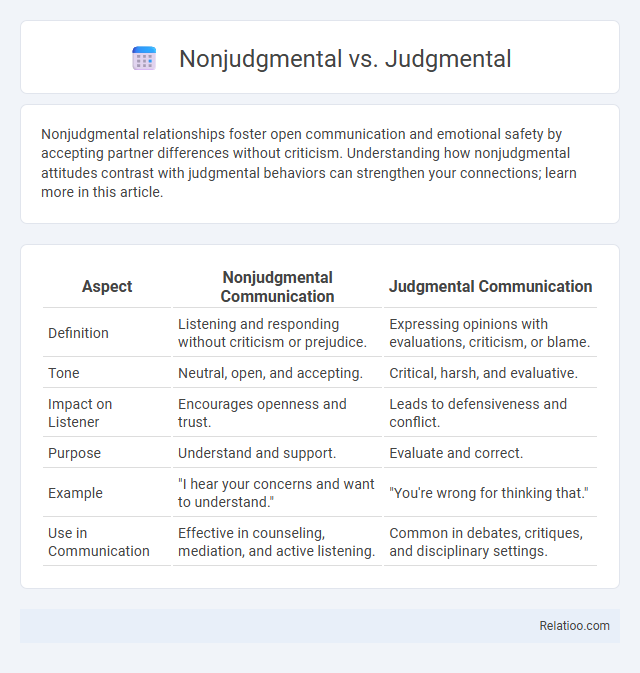Nonjudgmental relationships foster open communication and emotional safety by accepting partner differences without criticism. Understanding how nonjudgmental attitudes contrast with judgmental behaviors can strengthen your connections; learn more in this article.
Table of Comparison
| Aspect | Nonjudgmental Communication | Judgmental Communication |
|---|---|---|
| Definition | Listening and responding without criticism or prejudice. | Expressing opinions with evaluations, criticism, or blame. |
| Tone | Neutral, open, and accepting. | Critical, harsh, and evaluative. |
| Impact on Listener | Encourages openness and trust. | Leads to defensiveness and conflict. |
| Purpose | Understand and support. | Evaluate and correct. |
| Example | "I hear your concerns and want to understand." | "You're wrong for thinking that." |
| Use in Communication | Effective in counseling, mediation, and active listening. | Common in debates, critiques, and disciplinary settings. |
Understanding Nonjudgmental vs Judgmental Attitudes
Nonjudgmental attitudes emphasize empathy, open-mindedness, and acceptance, allowing you to understand others without imposing personal biases or criticisms. Judgmental attitudes, however, involve forming negative opinions or evaluations that can hinder effective communication and damage relationships. Cultivating a nonjudgmental mindset fosters emotional intelligence, improves interpersonal connections, and promotes a more supportive environment.
Defining Judgmental Behaviors and Their Impact
Judgmental behaviors involve forming negative opinions about others based on incomplete information or personal biases, often leading to misunderstandings and strained relationships. Nonjudgmental attitudes foster open communication, empathy, and acceptance, allowing you to build trust and deeper connections. Recognizing the impact of judgmental behavior helps you cultivate a more supportive and respectful environment.
The Essence of Nonjudgmental Perspectives
The essence of nonjudgmental perspectives lies in fostering open-mindedness and empathy, allowing individuals to observe experiences without assigning value or criticism. Emphasizing acceptance over evaluation promotes emotional resilience and authentic connection in interpersonal relationships. Contrasting judgmental viewpoints, nonjudgmental attitudes reduce bias and improve mental well-being by encouraging objective understanding and compassion.
Psychological Roots of Being Judgmental
Judgmental behavior stems from psychological roots such as insecurity, fear, and past trauma, often serving as a defense mechanism to establish control or superiority. Nonjudgmental attitudes emerge from empathy, self-awareness, and emotional resilience, encouraging open-mindedness and acceptance without immediate evaluation. Cultivating your nonjudgmental mindset enhances emotional intelligence and fosters healthier interpersonal relationships by reducing biases and preconceptions.
Benefits of Practicing Nonjudgmental Communication
Practicing nonjudgmental communication enhances empathy and builds trust by fostering an open, supportive dialogue free of criticism and assumptions. It reduces conflict and defensiveness, enabling clearer understanding and more effective problem-solving in personal and professional relationships. Nonjudgmental communication promotes emotional safety and inclusivity, encouraging diverse perspectives and deeper connections.
Negative Consequences of Judgmental Mindsets
Judgmental mindsets often lead to increased stress, damaged relationships, and hindered personal growth by fostering negativity and reducing empathy. These mindsets can create social barriers, inhibit open communication, and perpetuate biases, which negatively impact mental health and social cohesion. Embracing nonjudgmental attitudes promotes understanding, emotional resilience, and constructive interactions, mitigating the adverse effects associated with judgmental thinking.
Nonjudgmental Listening: Key Techniques
Nonjudgmental listening involves fully concentrating on the speaker without forming opinions or interruptions, promoting a safe space for open communication. Techniques include active listening, which emphasizes understanding through paraphrasing and asking clarifying questions, and maintaining neutral body language to avoid signaling bias. This approach enhances empathy, reduces conflicts, and fosters stronger interpersonal relationships by prioritizing acceptance over evaluation.
Overcoming Judgmental Thoughts: Practical Tips
Overcoming judgmental thoughts involves cultivating a nonjudgmental mindset through mindful awareness and self-compassion. You can practice challenging automatic critiques by replacing them with empathetic and objective observations, helping to reduce internal bias and promote emotional resilience. Techniques such as meditation, journaling, and seeking diverse perspectives support this transformation by fostering greater understanding and acceptance.
Nonjudgmental vs. Judgmental in Relationships
Nonjudgmental communication in relationships fosters trust, empathy, and open dialogue, allowing partners to express feelings without fear of criticism. Judgmental behavior, by contrast, often leads to defensiveness, misunderstanding, and emotional distance. Prioritizing a nonjudgmental approach enhances emotional connection and conflict resolution, promoting healthier and more supportive partnerships.
Fostering a Nonjudgmental Environment: Action Steps
Fostering a nonjudgmental environment involves actively promoting empathy, open communication, and respect for diverse perspectives. Implementing regular training on implicit biases and encouraging reflective listening can reduce judgmental attitudes and create safe spaces for honest dialogue. Establishing clear behavioral guidelines and providing ongoing support reinforces a culture where individuals feel valued and understood without fear of criticism.

Infographic: Nonjudgmental vs Judgmental
 relatioo.com
relatioo.com